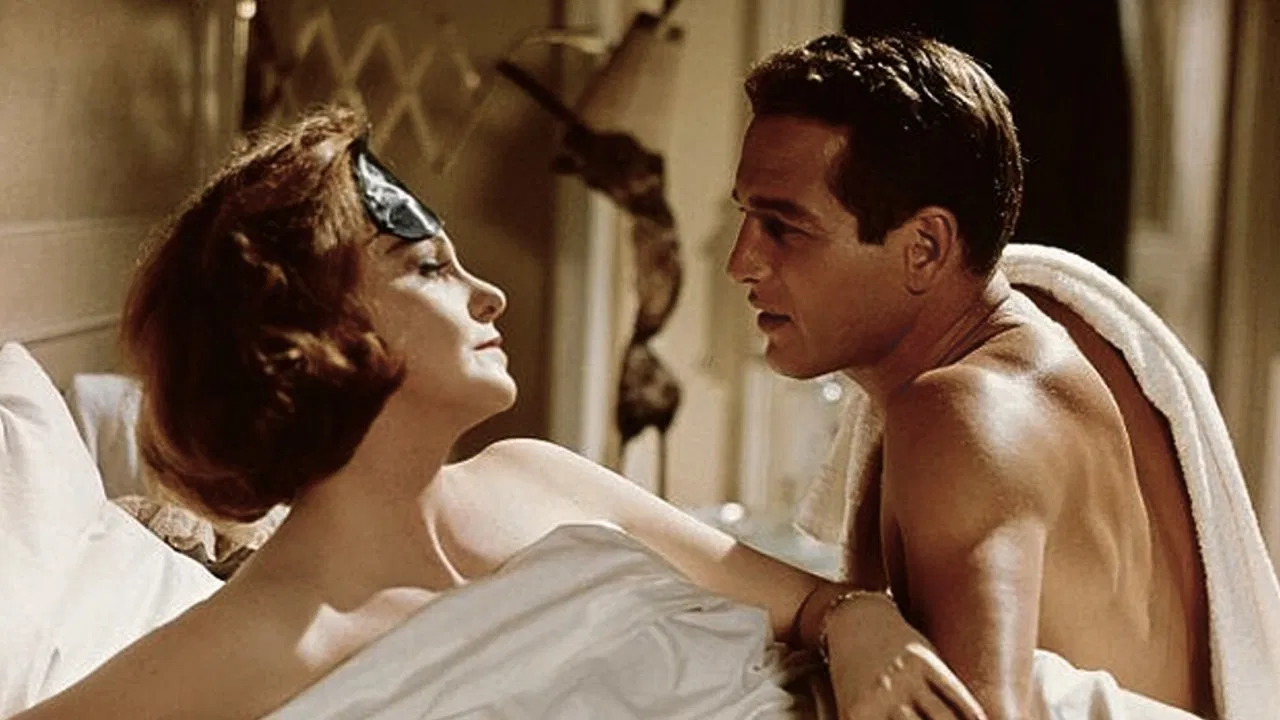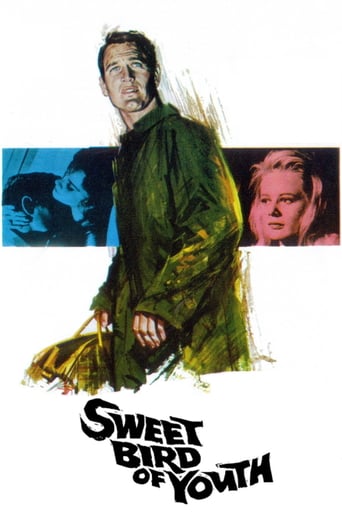

In Sweet Bird of Youth, Paul Newman reprises his stage role in Tennessee Williams's play. If you've never seen a Tennessee Williams story, or if you're not used to play-to-movie adaptations, this isn't the best one for you to start with. It's very wordy, very slow, and very obvious it was written for the stage.Newman plays his specialty: a bad boy who comes back to his hometown and stirs up trouble. If you're a fan, you won't be disappointed by his performance. He's been away, trying to make it as a Hollywood actor, and when he returns, he brings a has-been, booze-soaked older actress with him. Geraldine Page plays her specialty: just shy of crazy. She vacillates between losing her mind and taking the audience down with her, and realizing how pitiful she is and gaining the audience's sympathy.A young and beautiful Shirley Knight enters the picture as the girl Paul Newman left behind. She's sweet and lovely, and ironically named Heavenly. For those of you who know Tennessee Williams, you know this story will be tragic. The dramatic setup is intense, and the title hints at sadness. It's not the best movie, and at times it's hard to watch, but if you like this genre, you'll want to add Sweet Bird of Youth to your list.
... View MoreIn one of the silliest serious movies of the 1960's, Tennessee Williams has stereotyped everyone except Aunt Donnie as corrupt, nasty, evil trash. Mr. Williams must have had an amazing hatred for the human race to have written the whole lot of us as such garbage.A partial list of persons stereotyped for Mr. Williams broad brush of contempt: Hollywood actresses, gigolos, politicians, police, churchgoers, anyone from the South, doctors, hotel managers, plus anyone just standing around.Every scene in the film is predictable; none of it reflects any real people or situations; yet there are a large number of "intellectuals" who have always swallowed up his drivel.To be fair, a few of his works, including "Streetcar" are really good. Sweet Bird of Youth isn't one of them.
... View MorePlaywright Tennessee Williams has said he slept through the 1960s. He's still awake here, though maybe a bit groggy."Sweet Bird of Youth" is full of juicy parts and vicious scenes. Paul Newman is a young man who has been traveling around -- New York, Hollywood -- seeking to cash in on his good looks, so far without success. This vision of mortal splendor was imparted to him by Boss Finley, Ed Begley. Finley is not called "Boss" for nothing. He's insinuated himself into one powerful political office after another in this Southern state and now runs it as his personal fiefdom. The state police serve as his body servants.Years ago, love was growing between Newman's character, Wayne Chance, and Begley's daughter Heavenly, played by succulent blond Shirley Knight. Love is a fine thing and all that, but to Begley it was an irritant because Heavenly was a débutante whereas Newman was some kind of BUSBOY at the local hotel. You and Heavenly want to get married and that's great, Begley tells him, but you got to go out and conquer the world first so's to be worthy of her. Hollywood and New York, that's the ticket. Speaking of tickets, here's a one-way to New York and a hundred dollars to go with it. Now seek your fortune, and good luck to ya. You come back now, sometime in the distant future, you hear?Dumb Newman accepts the bribe and is off on a quest for the Holy Chalice. He returns to St. Claire once in a while to see Heavenly on the sly and during one of these visits he impregnates her before leaving to continue his pursuit of fame, which by now has acquired functional autonomy. Like Duddy Kravitz, he still believes he's doing it for someone else but he's mistaken.Basically, this film is the story of his final visit. Everyone in town warns him to stay away from Heavenly and get out of town. Never mind that he's dragged the famous but aging movie star Alexandra Del Lago, Geraldine Page, into St. Claire with him, along with her Cadillac and her money. We feel sorry for her because she's on the run from her latest movie, which she believes to have been a failure, and Newman is exploiting the hell out of her, but she's exploitative and narcissistic herself and exploits him back. This raises an interesting question. If a woman orders a man to make love, and he's ashamed of himself, can he still do it? I always could but, I mean, how about Newman's character? The plot get pretty complicated and I don't want to get into it in any detail. Besides, it's been modified to suit a more general audience. I remember seeing the theater marquis in New York with Newman playing the same part on the stage. I didn't get to see a performance but I read about it. Gee, that was a long time ago. I feel antediluvian.The film's writer and director, Richard Brooks, is sometimes thought of as a man who castrated Tennessee Williams for the movie audience, what with the homosexual theme of "Cat On a Hot Tin Roof" being further submerged, and then this one, in which the world "castration" is particularly apt. But then, in the 50s, you could only push the envelope so far.Boss Finley's goons bash Newman's face in so he'll never be beautiful again. But does it matter? You bet it doesn't. Newman and Knight run off happily together. Geraldine Page discovers her latest movie wasn't a disaster at all but the greatest hit in the history of the entire planet and she skids off in her Cadillac, happy as only a vicious lover of self can be. Word of some skeletons in the Finley closet are made public and the voters and higher authorities reject him and Begley winds up ruined. This is what is known as a "happy ending" in the trade.Newman is something of a bastard in this film and the part is within his range, just as "The Hustler" and "Hud" were, but it's still one of his more lackluster performances. Geraldine Page's character is over ripe and she makes the most of it. The hysteria is delicious. Shirley Knight is just adequate. But Ed Begley is great -- toothy, overbearing, treacherous, sadistic, barking out orders to massacre people in between the hollow and flagrantly phony greetings. His girl friend, Madeleine Sherwood as "Miss Lucy," matches him in her determine spite.
... View More"Sweet Bird of Youth" came towards the end of Hollywood's Tennessee Williams cycle of the fifties and early sixties, being preceded by such films as "A Streetcar Named Desire", "Cat on a Hot Tin Roof" and "Suddenly Last Summer", and closely followed by "Period of Adjustment" and "Night of the Iguana". Indeed, Williams is an author whom I know better from the cinema than from the theatre; he lacks the following in Britain that he enjoys in his native America, and performances of his plays here are infrequent. ("Sweet Bird ..", for example, was not performed in London's West End until 1985, nearly 30 years after it was written).The main character is Chance Wayne, a drifter who returns to his Southern home town. He left the town several years ago with high hopes of becoming a Hollywood actor, but he has enjoyed little success, and has ended up as a gigolo, preying on lonely older women. (His name is highly significant. Wayne is a "chancer", one who lives by his wits and enjoys taking risks. The surname at this period would have evoked the great Hollywood star John Wayne, but Chance has had none of his namesake's success).Wayne's latest conquest is a film star named Alexandra del Lago. Alexandra was once beautiful and highly successful, but is now ageing, addicted to drugs and alcohol, lacking in self-confidence and terrified of losing her looks. Wayne is only interested in Alexandra because he wants her to use her influence to advance his stalled acting career; his main purpose in returning home is to rekindle his love affair with his former girlfriend, Heavenly. Heavenly is the daughter of the local political boss Tom Finley, a Huey Long-style politician, who maintains a grip on State politics through corruption and strong-arm tactics. It was Finley who forced Wayne to leave town after he got Heavenly pregnant, a pregnancy which was terminated by abortion.The emotional, passionate nature of many of Williams' characters made his plays very popular with film-makers, but in the fifties the American theatre tended to be more liberal than the American cinema as regards the portrayal of sexual themes, and a number of his plays were somewhat bowdlerised when turned into films. "Sweet Bird of Youth" is no exception. The reasons why Finley ran Chance out of town are not the same in the two versions; in the play he infected Heavenly with a venereal disease, something unmentionable in Production Code Hollywood. (Pregnancy outside marriage and abortion were quite controversial enough). The ending is very much softened compared with the one Williams originally wrote.Paul Newman plays Wayne in the same cool, nonchalant, laid-back style which characterised a number of other his roles. (It was Steve McQueen who earned the nickname "King of Cool", but Newman could have been a pretender to his throne). Several of these were also drifters, such as Cool Hand Luke or Ben Quick in "The Long Hot Summer". For me, however, the real stars of the film are not Newman but Geraldine Page as Alexandra and Ed Begley as Finley. Page (who was nominated for "Best Actress") was excellent as the drunken, self-pitying junkie, and perhaps even better at the end of the film when Alexandra recovers her self-confidence after discovering that her latest film has proved an unexpected success. Begley certainly deserved his "Best Supporting Actor" award for his portrayal of the ranting demagogue Finley; the one nomination which rather surprised me was "Best Supporting Actress" for Shirley Knight (Heavenly), as she did not seem to have all that much to do."Sweet Bird of Youth" is not quite in the same class as some of the other entries in the Williams cycle, such as "Cat on a Hot Tin Roof" (which was also directed by Richard Brooks and also starred Newman) or "A Streetcar Named Desire" with its four towering performances in the leading roles. It perhaps represents a rather conservative style of film-making, looking back to the fifties rather than to the stylistic revolution of the late sixties. (After "Night of the Iguana" in 1964 Hollywood was to fall out of love with Tennessee Williams). It is, however, well-made and well-acted, and still remains enjoyable today. 7/10
... View More